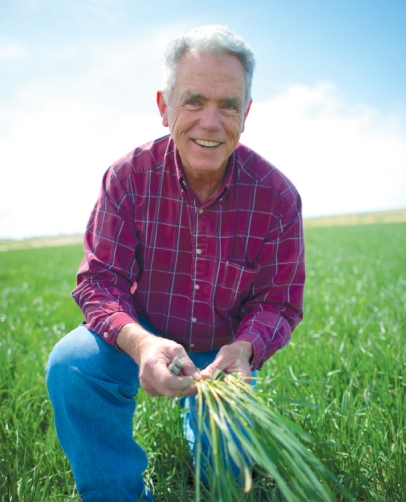An Unlikely Crusader
Who would you picture if asked to visualize Idaho's pioneering organic farmer? An outspoken critic of pesticide-intensive, conventional agriculture? A person who loves the limelight and a good fight? Perhaps a youngish vegan sporting a head full of dreadlocks and a few farm-focused tattoos?
Well, the 70-year-old Mike Heath is none of those people. He is, instead, a quiet, humble and noticeably shy man. Yet, a lifetime of success in organic agriculture, along with the relatively recent national attention from none other than Michael Pollan, has fittingly cast Heath in that role: He is Idaho's pioneering organic farmer.
Fate rather than personal desire or passion was what first brought Heath to the world of farming. He was a young man in 1965, living in Buhl, Idaho, working on the family farm to help out his father-in-law recover from an accident. Attending to the sweet corn, hay and occasional grain was part of Heath's daily duties. So was the common application of chemical pesticides. During that time he witnessed an outbreak of grasshoppers and the resulting countywide spraying of Malathion. After that chemical was applied, the third cutting of hay just stopped growing, Heath remembers, and the previously treated spotted aphids began to reappear. Apparently, the Malathion had also killed off the good bugs that would have controlled the aphids, thus creating a new set of problems. It was about then that Heath began to question the effects of chemicals on crops, and ultimately on the health of the people who consumed them.
After three years of assisting his father-in-law, the still young, idealistic and restless Heath says he was yearning to be part of a bigger world (he was also tired of milking cows twice a day). He set off overseas as a member of the United Methodist Church, and began assisting in agricultural and rural development. He spent time in Sarawak, Malaysia and observed the farming methods of the Chinese farmers in that area. Following suggestions from local extension personnel and sponsoring chemical companies, those farmers sprayed pesticides on rice and other crops every few days. A researcher in the area told Heath that the fields had no beneficial insect populations and needed more and more chemicals to control pests over time. Heath then moved on to the South Pacific island of Vanuatu where he saw a very different agricultural story. The land was fertile, as the island has a live volcano and thus rich volcanic soil, and the indigenous people farmed that land organically, avoiding the negative impacts of pesticides. Heath was inspired.
In 1979, Heath returned to Idaho with a new focus on organic farming. He began to try out the methods he'd learned in the South Pacific on his crops and was successful in growing potatoes and alfalfa without the use of chemicals. He then added sweet corn, beans and grain. As those new crops showed promise, Heath started to focus on marketing them, but at the time those markets were mostly in California. Over time, that changed. Although he continues to sell fifty percent of his harvest out of state, there is now a growing Idaho market for Heath's produce. He and his wife Marie sell at the Twin Falls Farmer's Market and the Hailey and Wood River Farmer's Markets. In 2006, the Heath's 180 acre M&M Heath Farms, near Buhl, became a member of Idaho's Bounty, an organization that picks up and distributes the farm's produce and is currently the farm's largest customer. Heath describes the long list of products his customers now expect as "stupidly diverse," but remarks that having a wide variety of organic vegetables is one of the reasons his business is so successful.
Michael Pollan interviewed Heath for his 2002 book "The Botany of Desire" and included a location shoot at M&M Heath Farms in the 2009 PBS documentary of the same name. In the film, Pollan discusses the issue of genetic modification and compares it to Heath's organic methods. Pollan states that "nature resists our control" as Heath explains his attempt to assist rather than control by using natural, sometimes very simple, methods of pest management such as placing lady bugs on his plants to control aphids. Although Heath pays higher labor costs, he does not incur the high costs of pesticides. He is able to sell his products at higher prices because they are organically grown. Heath says Pollan's attention helped people become more familiar with his business and describes being in the film in his usual succinct fashion: "Quite exciting," he says.
When asked about his relationship with other Idaho farmers in the beginning of his organic career, Heath says his peers would probably have described him as "silly and stupid." Over the years, though, he has gained respect in the local agricultural community: Putting your head down, working hard, believing in what you do and creating a successful business are traits any farmer admires. In turn, Heath isn't quick to judge his neighbors or their farming methods. It's not often that one can make his point in such a quiet manner, but Heath has done just that.
The Heaths continue to grow a large amount of organic produce and use sustainable practices such as crop rotation, water conservation and crop diversification. Their list of organic products include not only field corn, potatoes, winter squash, summer vegetables and beans, but also organic oats, grains, meat and eggs. Heath says he and Marie are looking forward to retirement, but plan to continue to be a resource for fledgling organic farmers. Once again Heath shows very little ego and a lot of organic soul.




